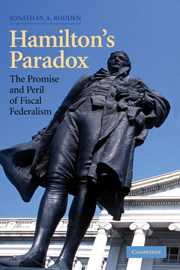Book contents
- Frontmatter
- Contents
- Preface
- Acknowledgments
- 1 INTRODUCTION AND OVERVIEW
- 2 PROMISE AND PERIL: INTELLECTUAL HISTORY
- 3 SOVEREIGNTY AND COMMITMENT
- 4 THE POWER OF THE PURSE: INTERGOVERNMENTAL GRANTS AND FISCAL DISCIPLINE
- 5 DISEASE OR CURE? POLITICAL PARTIES AND FISCAL DISCIPLINE
- 6 AN APPROACH TO COMPARATIVE CASE STUDIES
- 7 FISCAL FEDERALISM AND BAILOUTS IN POSTWAR GERMANY
- 8 THE CRISIS OF FISCAL FEDERALISM IN BRAZIL
- 9 THE CHALLENGE OF REFORM IN FEDERATIONS
- 10 THE ORIGINS OF SUBNATIONAL SOVEREIGNTY
- 11 CONCLUSIONS
- References
- Index
- Titles in the series
3 - SOVEREIGNTY AND COMMITMENT
Published online by Cambridge University Press: 14 January 2010
- Frontmatter
- Contents
- Preface
- Acknowledgments
- 1 INTRODUCTION AND OVERVIEW
- 2 PROMISE AND PERIL: INTELLECTUAL HISTORY
- 3 SOVEREIGNTY AND COMMITMENT
- 4 THE POWER OF THE PURSE: INTERGOVERNMENTAL GRANTS AND FISCAL DISCIPLINE
- 5 DISEASE OR CURE? POLITICAL PARTIES AND FISCAL DISCIPLINE
- 6 AN APPROACH TO COMPARATIVE CASE STUDIES
- 7 FISCAL FEDERALISM AND BAILOUTS IN POSTWAR GERMANY
- 8 THE CRISIS OF FISCAL FEDERALISM IN BRAZIL
- 9 THE CHALLENGE OF REFORM IN FEDERATIONS
- 10 THE ORIGINS OF SUBNATIONAL SOVEREIGNTY
- 11 CONCLUSIONS
- References
- Index
- Titles in the series
Summary
This depends on principles of human nature, that are as infallible as any mathematical calculations. States will contribute or not, according to their circumstances and interests: They will all be inclined to throw off the burthens of government upon their neighbors.
Alexander Hamilton, Speech in the New York Ratifying Convention, 1788The previous chapter argued that in order to bring the theory literature closer to evolving empirical realities around the world, the old notion of decentralization as a clean division of sovereignty among vertically arranged governments must be replaced by an approach that highlights the murkiness and contestability of sovereignty in a world with opportunistic, politically motivated actors. The previous chapter also reviewed some rather attractive and time-honored arguments linking decentralization, federalism, and fiscal discipline, but then examined cross-country data suggesting that modern forms of decentralization and federalism seem inconsistent with their basic assumptions.
In order to pave the way for an explanation of the wide range of experiences related to decentralization, federalism, and fiscal discipline around the world, this chapter takes a political economy approach to the issue of sovereignty over debt in multitiered systems. It presents a dynamic game of incomplete information played between higher and lower-level governments, each of which has incentives to see that the other government undertakes painful adjustment to negative income shocks. A key lesson is that when sovereignty is unclear or disputed, actors use the information available to them and assign probabilities to the likely ultimate locus of authority in the event of a conflict.
- Type
- Chapter
- Information
- Hamilton's ParadoxThe Promise and Peril of Fiscal Federalism, pp. 48 - 74Publisher: Cambridge University PressPrint publication year: 2005

